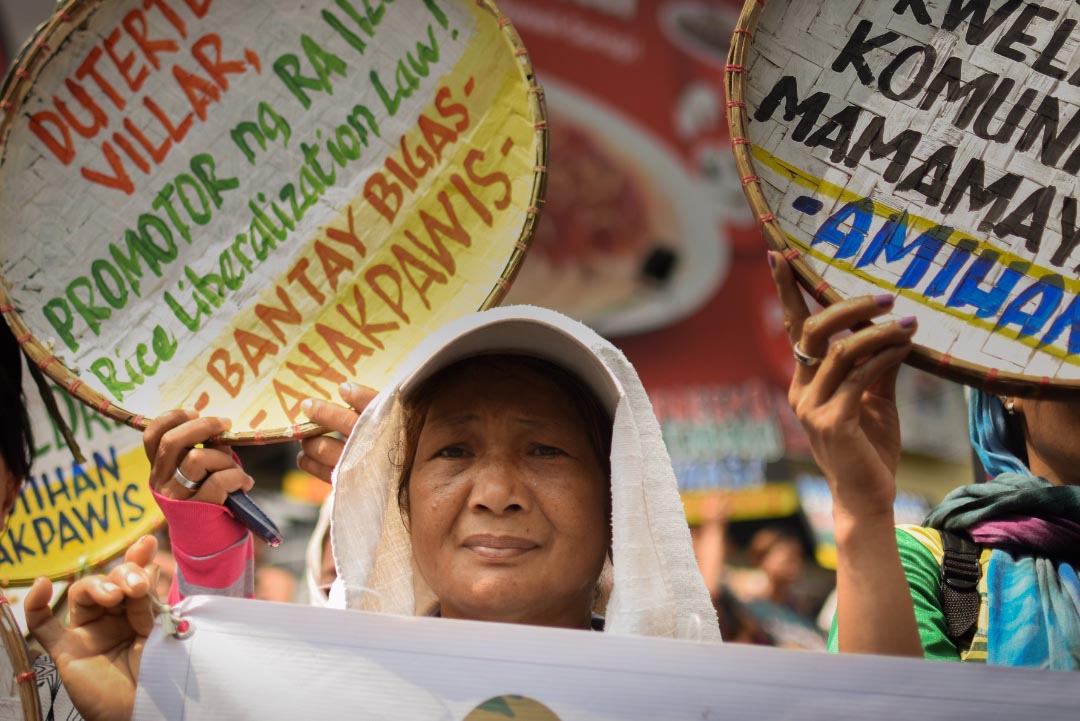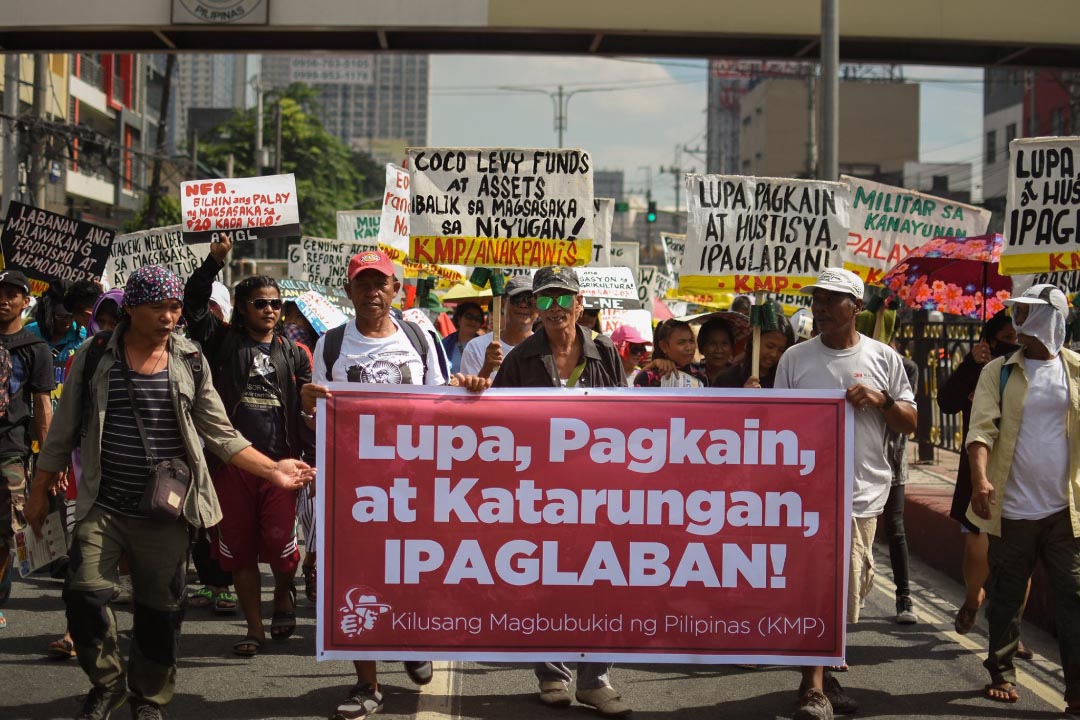“Once totally fed up, farmers could actually lead a peasant uprising in the countryside that is directed at Duterte,” said Danilo Ramos, chairperson of Kilusang Magbubukid ng Pilipinas.
By JOHN AARON MARK MACARAEG
Bulatlat.com
MANILA – Dodong Bagsak, 35, still laments over his banana and eggplant farm in Rodriguez, Rizal which was converted into a quarrying site in 2017.
Bagsak said that he never wanted to give up, he and his co-farmers put up a fight, but it just eventually dissolved to the usual story of the one with the money and Bagsak who lacks it. He is now just a worker struggling to raise his four children but he’s still active in a farmers’ group in Rizal.
Bagsak joined the multi-sectoral protest in Manila, Oct. 21, demanding the government to act on the plight of the farmers. The peasant-led action underscores that the “emancipation of the tiller of the soil from his bondage” is not yet realized 47 years after the signing of Presidential Decree 27 by the late dictator Ferdinand Marcos.
Fisherman George Cacaruyan also came all the way from Agoo, La Union, He, too, could not escape what he called as “farmer-insensitive” policies imposed by the government.
Cacaruyan told Bulatlat that the income he was getting from fishing is not enough to buy a kilo of rice from National Food Authority (NFA) priced at P27. “For us, a family of six, a kilo of rice is good only for a day with three meals. And to survive with the meager income I get from fishing, getting by two meals daily is already a struggle,” said.
Because of this, his sons in Grade 10 and 11 had to stop studying to earn more for their food. Sometimes, both children would accompany him in the open sea or work in the farms.
Both of their stories summed up the three words to which the life of the rural poor revolves–land, food, justice–and how they struggle for these.
Bagsak and Cacaruyan belong to the poorest sectors. According to independent think-tank Ibon Foundation, poverty incidence among farmers is at 34.3 percent and fisherfolk at 34 percent.
Palay prices have dropped to as low as P7 per kilo due to the influx of imported rice brought about by the rice liberalization. The prices of rice in the market have not gone down, contrary to the promise of the proponents of Rice Tariffication Law.
According to Ibon, government’s neglect has led to the deterioration of the agriculture sector, with its share in the economy shrinking from over 40 percent in the 1960s to less than 10 percent in 2018.

A report from Kilusang Magbubukid ng Pilipinas (KMP) showed that since 2016 until December 2018, only 91,776 hectares of land were distributed to agrarian reform beneficiaries, making the Duterte administration slowest in land distribution compared with previous administrations.
Still, KMP said that certificates of land ownership awards do not necessarily equate to ending the land monopoly. “They are no more than ceremonial handing out of certificates. The process of installation of beneficiaries under DAR takes forever,” Danilo Ramos, KMP chairperson, said.
Land grabbing and conversions
Former Agrarian Reform Secretary and KMP Chairman Emeritus Rafael Mariano pointed out that Duterte has allowed massive land grabbing and conversion of agricultural lands. This, he said, has displaced farmers and has undermined the country’s food security.
In Central Luzon, known as the country’s rice granary, development companies were reported to be consistent in converting agricultural lands into subdivisions and eco-tourism projects. These include the New Clark City covering 9,450 hectares of land in Pampanga and Tarlac and the Aurora Pacific Economic Zone and Freeport Authority, which poured cement on 12,923 hectares of land.
“The right for food is a fundamental right. But why is that the food producers themselves are the very first to denied of that right?” Mariano said.
Farmers from Laguna, Cavite, Quezon, Batangas, Rizal, Tarlac, Nueva Ecija, Pampanga, Ilocos Sur, Ilocos Norte, La Union, Abra, Kalinga, Mt. Province and Ifugao joined the protest in Manila. Simultaneous actions were also held in Cagayan, Isabela, Sorsogon, Albay, Cebu, Negros, Iloilo, and Capiz.
Militarization
Farmers from different parts of the country criticized the military presence in their communities.
Orly Marcellana of Katipunan ng mga Samahang Magbubukid sa Timog Katagalugan (Kasama-TK) said there were 15 battalions of Armed Forces of the Philippines deployed in Southern Tagalog, the same number of troops in the Northern Mindanao Region where Martial Law is currently in effect.

In Lupang Ramos in Cavite, a camp of the Philippine National Police is located in the middle of the farm. “Policemen are just sitting there doing nothing,” Marcellana said. “If the resources for the camp will be used in subsidies for farmers, then it’d be better.”
In the Cordillera, KMP said that military presence “gravely affected” the farmers livelihood. They cannot go to their farms for fear that they would be summarily executed on false accusation that they are New People’s Army (NPA) fighters or NPA supporters.
According to human rights alliance Karapatan, 216 farmers have been killed under the Duterte administration.
Peasant uprising
Farmers continue to assert their demands—from increase in palay and copra prices, repeal of the Rice Tariffication Law, a halt to land use conversion and land grabbing, provision of subsidies and support services to genuine agrarian reform and rural development.
If these issues remain unaddressed, Ramos said, “Once totally fed up, farmers could actually lead a peasant uprising in the countryside that is directed at Duterte.”
The post Peasants warn of uprising unless government acts on their demands appeared first on Bulatlat.




